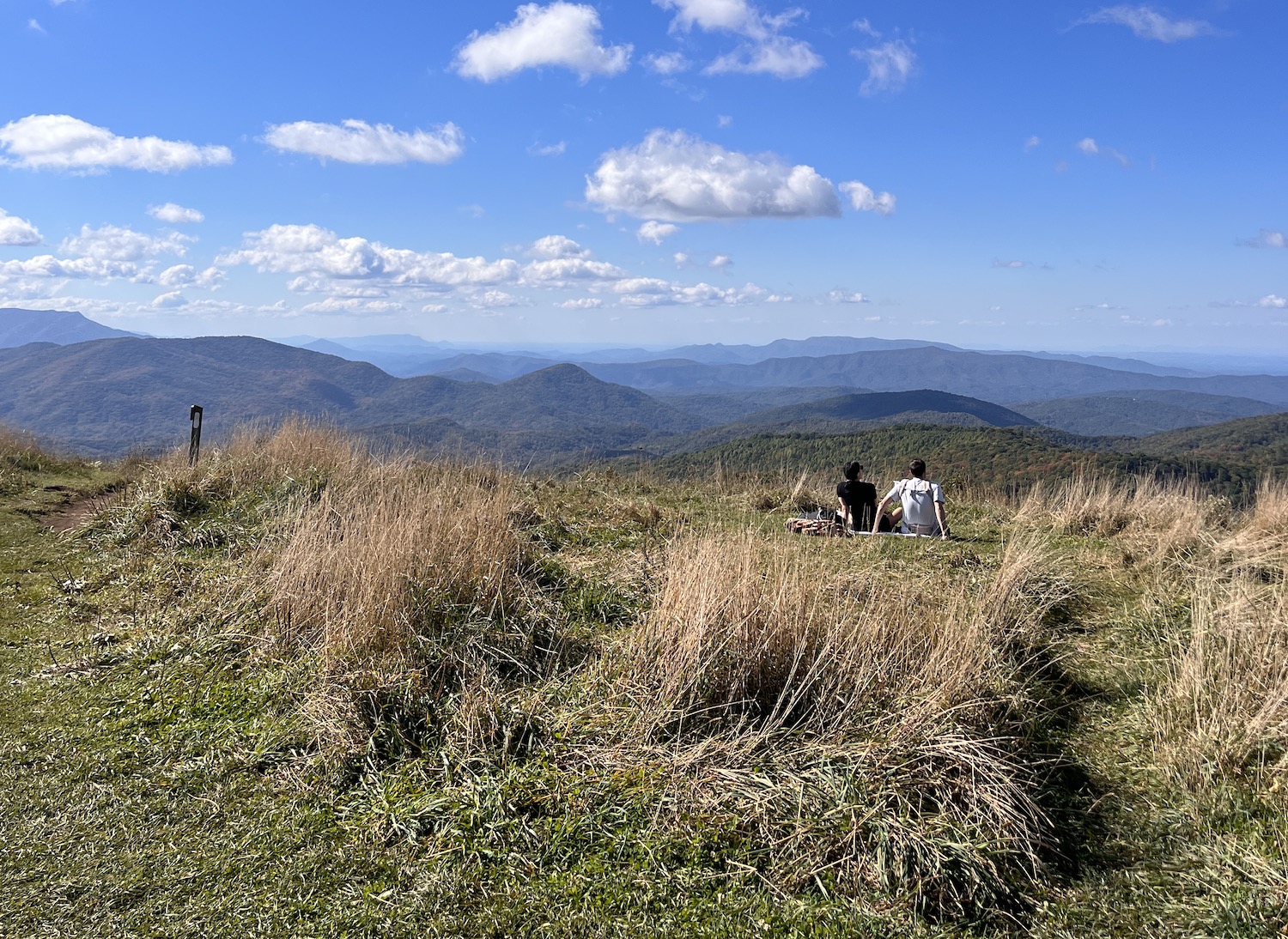
A couple sits atop the grassy summit of Max Patch, taking in the views. Restoration on Max Patch began after overuse damaged the bald. Photo by Megan Pettey
By Megan Pettey
“Enjoy but do not destroy your public lands,” advises a notice posted on the information kiosk greeting hikers as they embark on the scenic Max Patch Loop.
Located in Hot Springs, North Carolina, this 1.5-mile trail is often hailed for its breathtaking panoramic views featuring hundreds of miles of mountain ranges across Southern Appalachia. One might think it would go without saying not to harm a place as beautiful as Max Patch, but the U.S. Forest Service has recently extended restrictions limiting use of the trail to protect the area as it continues to heal from years of abuse.
Nicknamed the “Jewel of the Southern A.T.,” this portion of the Appalachian Trail is special for a number of reasons. Max Patch is a grassy bald, meaning it’s covered in thick, native grasses where forest growth would typically be expected.
Almost every 6,000-foot mountain in the Eastern United States is within 50 miles of Max Patch, with the exception of Mt. Washington, according to Paul Curtin, A.T. supervisor for Carolina Mountain Club, a hiking and trail maintenance group.
“And you can see about 200 miles of the Appalachian Trail from the top of Max Patch; that’s 10% of the trail,” Curtin says. “There aren’t too many places where you can do that because there’s usually other mountains in the way or there’s trees in the way. That’s really a rare thing.”
Max Patch is also unique in how it offers great reward with little effort. The short hike is very moderate for the average person, according to District Ranger of Pisgah National Forest Jen Barnhart, which is one of the many reasons why so many visitors are attracted to the area. However, since Max Patch is located directly on the Appalachian Trail, hikers can connect to longer trails in the area for a lengthier, more strenuous hike if they desire.
“What makes [Max Patch] special is that you can really feel like you are away from the everyday stresses to enjoy nature in all of its beauty with the monarch butterflies fluttering along and the chirping of golden-winged warblers,” Barnhart says.

During the COVID-19 pandemic, crowds flocked to Max Patch, setting up dozens of tents on the bald. Photo by Mike Wurman
Overuse Turned Abuse
Unfortunately, popularity hasn’t been kind to Max Patch. At the end of 2017, the Carolina Mountain Club began to notice signs of growing abuse of the land. Hikers trekked off path, creating unofficial, user-created paths by trampling vegetation and scarring the grassy bald. Trash and human waste littered the once-pristine summit. Campers chopped down fences meant to block off protected areas and hacked at native trees, leaving visible slashes that have yet to heal. Parking became so overcrowded that it often completely blocked Max Patch Road, creating a safety hazard for those who live up the gravel road.
At the peak of overuse, club members hauled truckloads of trash off the trail every weekend, according to Curtin. He met with members of the nearby Spring Creek community who raised concern over the many campfires on the windy summit, which could have easily grown out of control.
“It was an ugly eyesore,” writes Alice McVey in an email. McVey is a resident of Spring Creek and member of the Visitor Use Management Committee for Max Patch. “On several occasions we found smoldering fires people had left. It jeopardizes anyone who lives in this area. Before the restrictions it was a big health and safety hazard. Traffic was at a standstill so if there was an emergency, no way personnel could get there.”
It was clear something had to be done. Carolina Mountain Club joined with the Appalachian Trail Conservancy, an organization that protects and advocates for the long-distance trail, and the U.S. Forest Service to create a Visitor Use Management Committee in 2018 and discuss the steps towards restoration. Though much effort went into mitigating the problem, the state of Max Patch continued to decline rapidly.
“It was kind of getting away from us faster than we could address it,” Curtin says.
In 2019, the groups formed a Trail Ambassador Program, which helped educate hikers about the situation and collected data to prove to the Forest Service that action was necessary for saving Max Patch. In early 2020, District Ranger Richard Thornburg put in a request for a camping ban, though Curtin explains that implementing these restrictions is a lengthy process that requires public input before a decision can be made.
“He started the process, but then he had to go off on a different job,” Curtin says. “And then nobody took his job for another six months, so nothing was really happening, and that’s when crap hit the fan.”
During the COVID-19 pandemic, crowds flocked to Max Patch. Curtin explains that college students unable to party at school drove from multiple states to camp out on the summit. Pictures started circulating showing dozens of tents scattered across the damaged bald, and finally momentum began to pick back up to put protections in place for the area.
Jen Barnhart was assigned as the new district ranger, and after nine months of working hard to implement restrictions on recreational use at Max Patch, the struggle finally paid off in June of 2021.
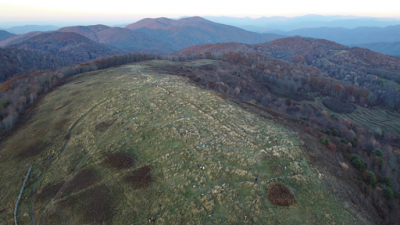
Two years after restrictions were placed on recreational use of Max Patch, scars can still be seen where crowds wore tracks into the bald. Photo by Mike Wurman
A Remarkable Recovery
The Forest Service released a press statement in July 2021 outlining the new restrictions in place for Max Patch, including a ban on camping and fires, a group size limit of 10 or fewer, a requirement for animals to remain on leash, and closing the area one hour before sundown and reopening one hour before sunrise.
“That was a lifesaver for our efforts out there because what was happening was just close to sacrilegious,” Curtin says. “It was just an assault on public land, which is terrible. So that really put an end to it, and that got us back ahead of the game again.”
The bald has already seen drastic improvements as a result of these measures, and the original restrictions were extended in June of this year through June 30, 2026, to allow for the continued healing of the area.
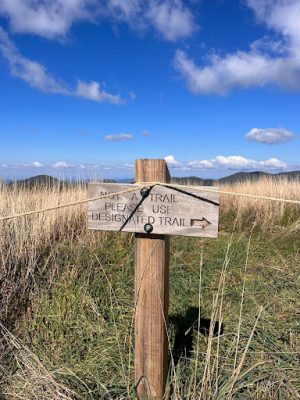
Multiple signs are posted along the Max Patch Loop trail to prevent hikers from veering off-path and trampling local vegetation. Photo by Megan Pettey.
“The primary factor was to continue the protection of public health and safety at Max Patch, including ecologically and visitor use experience factors,” Barnhart says. “Large groups, overnight camping and overcrowding in parking areas has improved from the initial closure order, but there is concern that those issues will rise again without maintaining the restrictions outlined in the order.”
“Every year we check to see where the social trails are and how much they’ve recovered, and they’ve recovered about two thirds since we first started,” Curtin says. “So it’s making a remarkable growth recovery.”
During favorable weather, trail ambassadors visit Max Patch every Friday, Saturday and Sunday to collect data on how many cars are in the parking lot, how many tents and large groups of people are visible, and how many animals are off leash. According to Curtin, the trail is improving in every aspect.
Part of remediating the area has included trail hardening so Max Patch can better withstand the number of people that will continue to visit. This means installing steps and gravel in certain areas to make the trail easier to walk on in the hopes that hikers won’t veer off-trail and cause harm to native vegetation. The newly erected kiosk at the start of the loop invites visitors to learn more about the area and outlines restrictions. Additionally, Carolina Mountain Club, Appalachian Trail Conservancy and the Forest Service created a website to educate guests prior to their hike.

Volunteers with Carolina Mountain Club repair damage to a trail during the 2023 National Public Lands Day at Max Patch. Photo by David Huff courtesy Carolina Mountain Club
Appalachian Trail Conservancy is also working to transform the area by reintroducing native species to Max Patch, such as various grasses and wildflowers that attract birds, bees and butterflies. Part of the long-term restoration plan includes planting shrubby trees that are ideal habitat for the golden winged warbler, a species they aim to attract.
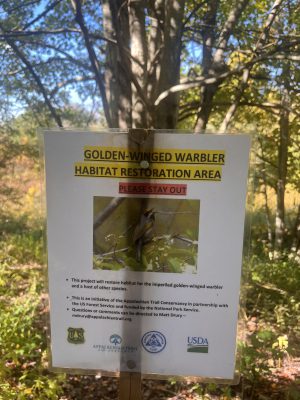
The U.S. Forest Service, Carolina Mountain Club and Appalachian Trail Conservancy are trying to introduce species such as the Golden Winged Warbler to the area. Photo by Megan Pettey.
This is the best Curtin can remember Max Patch looking.
“It’s been really transformational,” he says. “It’s just going to keep getting better and better too, because we have a long term plan for successful growth.”
Enjoying Nature Respectfully
As the area continues to recover, Curtin emphasizes that the most important thing is for hikers to stay on trail, as straying from the path causes the most damage to natural resources. The bald itself at the summit is rather resilient, so Curtin encourages guests to enjoy this area whether it be having a picnic, playing with their dog or flying a kite.
On a particularly bright October afternoon, multiple groups could be seen basking in the sunshine atop the grassy peak. Among them was a hiker named Jess, who didn’t want her last name shared, celebrating her birthday with three others and her dog.
“I just moved here in June, but we’re from Florida,” Jess said, rubbing her smiling pup’s belly. “So we just came here to get outside. We love the weather, the tall grass is so cute, all the flowers. This is happiness.”
Though it was their first time on the Max Patch Loop, Jess was aware of the restrictions in place. Regardless, she said they’re always sure to be respectful when enjoying nature.
“Just don’t leave your stuff, that’s what our little rule is when we come out,” Jess says. “Just take with you what you bring.”
Many have heard the saying “leave no trace,” a cardinal rule of hiking. Barnhart recommends visitors familiarize themselves with the Leave No Trace principles, which outline how to properly dispose of waste, minimize campfire impacts, respect wildlife and be considerate of others. The Leave No Trace website offers a free 45-minute course that dives deeper into these objectives, teaching others how to both enjoy and protect nature.
“Quite simply treat it like you own it because you all do since it’s public land,” Barnhart says. “Each of us are responsible for ensuring our national forest lands are in sustainable conditions for the current and next generations to enjoy.”
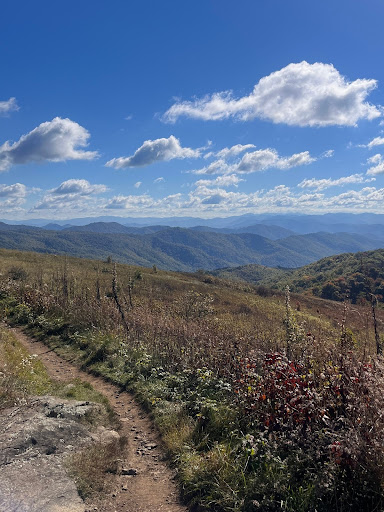
Wild vegetation creeps along the Max Patch Loop Trail, which offers views of rolling mountain ranges. Photo by Megan Pettey.
Next Steps for Max Patch
After the current restrictions are lifted in 2026, the Forest Service will evaluate whether the camping ban should be permanent or not, according to Curtin.
Despite major improvements, Barnhart notes there’s still much work to be done at Max Patch. Two persistent problems are the limited parking space and human waste around the parking area due to a lack of bathrooms.
Visitors can take a public opinion survey on the Max Patch website, which gathers input from guests regarding potential solutions to the bathroom and parking situation.
Related Articles
Latest News

Leave a comment
Your email address will not be published. Required fields are marked *
21 responses to “How Max Patch Bald is Finally Healing”
-
No camping for now – for sure. Anybody know what a bathroom at base would cost? Monthly? Dumpster? Logistics ideas? $usually follow good public works ideas…
-
A very similar problem on an even greater scale is being experienced on the Roan AT section from the Carver’s Gap trail access.
Overuse, lack of parking, habitat destruction, littering are all being experienced .The Max Patch program exemplifies how dedicated AT Trail Clubs and the SAHC Land Trust can and must partner
with the ATC and the USFS to develop mitigation strategies and strictly implement them. Doing less is not acceptable ! Nor is delay !The Roan Balds and the AT corridor was the initial focus of the now 50 year old SAHC effort, supported by the CMC ,to prevent the public loss of these nationally significant lands.
The recently formed ATC, SAHC, TEHCC and USFS must increase their efforts to find solutions and place them in action; the great CMC- USFS work on Max Patch demonstrates how this may be accomplished .
-
I hope there is some education about soil structure and how sensitive it is. Over on Black Balsam there are tons of little trails in to the meadow that is damaging. I don’t know how many years it takes to recover from compaction but people need to mind their foot prints as well.
-
It’s too precious to squander. We must continue to protect it by keeping the restrictions in place.
-
I have walked from the NC/TN line from the Sugarloaf mountain to Max patch and to see where you started from to where you finally end is what makes a person feel small on our God given planet !! First TEACH THE COLLEGE CROUD THAT THE EARTH IS NOT TO BE DESTROYED!!
SECOND if people can’t abide by the rules to go to Asheville and party but leave nature to people who can respect it since they can’t and last ,the forest service should arrest the people who can’t be responsible and make them clean all the crap up !!! -
No camping within 500 feet elevation to the edge of the bald. No fires on the bald. Gregory Bald in GSMNP is a great example. You can camp a 20 minute climb from the bald so you can easily enjoy sunrises and sunsets. You can sit up on the bald to watch the stars come out and then hike back down to camp. Only handicap parking within 3 miles of the bald. Half the people will respect it and take care. But the other half will destroy it.
-
I’m a born and raised local. What has been done to max patch is terrible to see. I remember the days when it was quiet and hardly no one around. Please keep the no camping restriction in place
-
No camping should ever be allowed again .Visitors from out of state, have no respect for the beauty of North Carolina . There should be restrictions in place at most of our state parks . Especially DuPont . In fact …..all of our mountains have been abused since Asheville became the trendy little hipster town .
-
I’m glad the area is recovering. I applaud the hard work of those involved. However I don’t think the practice of punishing good people because of bad is how we go about change. If every camping spot that has trash on it is closed , no one could camp in any forest in any state.
We need to get ahead of the problem, perhaps more funding to provide more resources, and more personnel not just to enforce but to educate.
But hey what do I know, I’m just a guy who enjoys time in the woods. -
No camping!
-
This is just terrible to see didn’t anyone know about the LEAVE NO TRACE that I consider to be a policy I through hiked the trail in 2019 it was beautiful
-
The problem that happened on Max Patch with the camping is one reason I built The Trail of Dreams. The trail is three miles long with private campsites along the way. The trail is all in the woods to the ridge line and back down no motorized vehicles are allowed. You must park your car and hike to your campsite. The trail is still in its building phase but can be hiked now but no camping.
-
Thanks to each of you who have worked so hard to make this happen! And let’s keep the restrictions and yes, there does need to be a privy across the road from the parking lot, maybe like the one at Murray Branch on River Road.
-
Want to know what Wil happen to Max Patch? Ask: Wil this be helpful to Hikers? If the answer is YES, then the ATC (the masters of the NPS) Wil FORBID whatever is Helpful for hikers!!! And, yes, the ATC says JUMP, the NPS says “HOW HIGH MASTER? as they squat ready to Jump.
-
Do not let visitors camp at Max Patch. If it is allowed to happen it will continue to happen meaning they will destroy it again. I see it too many times for visitors are off Trail in the vegetation. There was one idiot that drove his Jeep up to BearWallow Mountain. How he got up there I Can Only Imagine up the side on the vegetation. they have no respect for the rules they don’t care they will destroy Max Patch if you let them camp.
-
I was at Max Patch one year and couldn’t believe the disregard of nature. I’m not a tree hugger by any means but leave no trace is around for a reason! I picked up trash that wasn’t completely burned, cans and toilet paper! As much as I would love to camp on the bald again…please keep the restrictions!
-
Please continue current restrictions. Thank you from us All!
-
Leave it like it is no more camping.
-
My friend and I hiked Max Patch about 20 years ago completing a section we had missed when we had just starting section hiking as teenagers. We are in our 70’s now having made it to the Maine/New Hampshire line before age caught up to me. We look back to that hike as a highlight. Our recollection is of a grassy bald that had a portion used for grazing sheep. The trail was deep rut from erosion and foot traffic causing us to hike off to the side where there was grass. Sorry to read about the recent abuse, but glad to hear the efforts to restore the summit are being effective.
-
Camping ban forever. Comes down to no respect for the land no camping. I came through 2018 and it was beautiful on top,if we continue to allow camping the top will be dirt not grass. Please respect what God gave us.
-
Continue current restrictions please!!


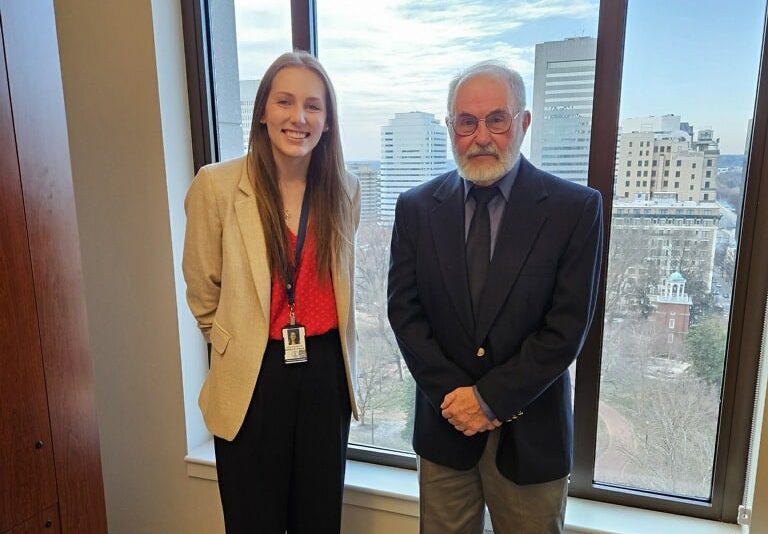
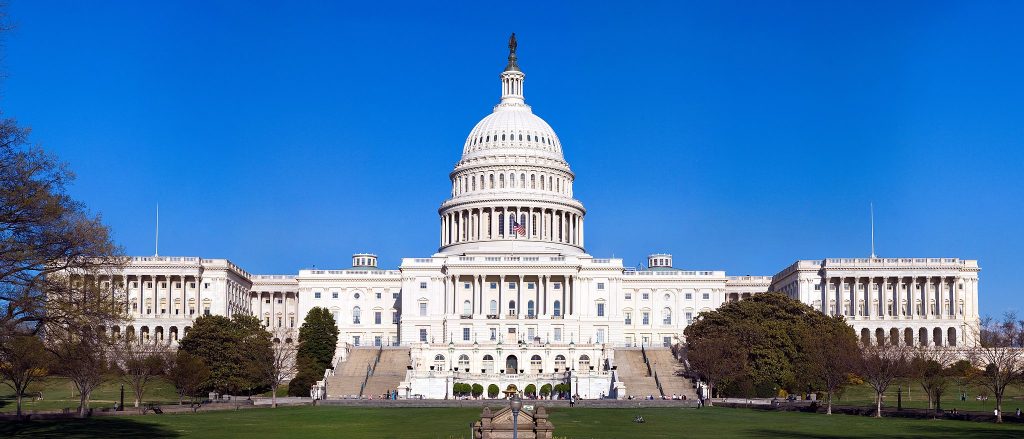

Leave a Comment